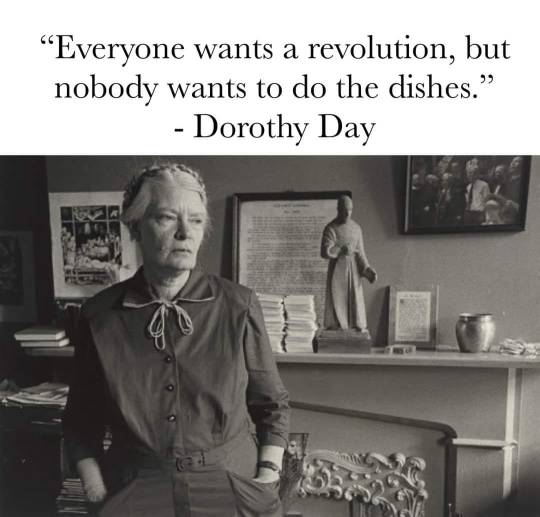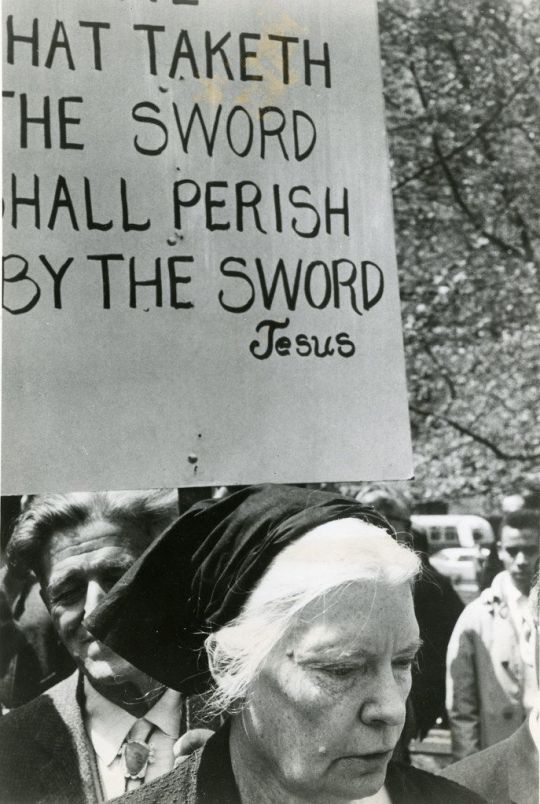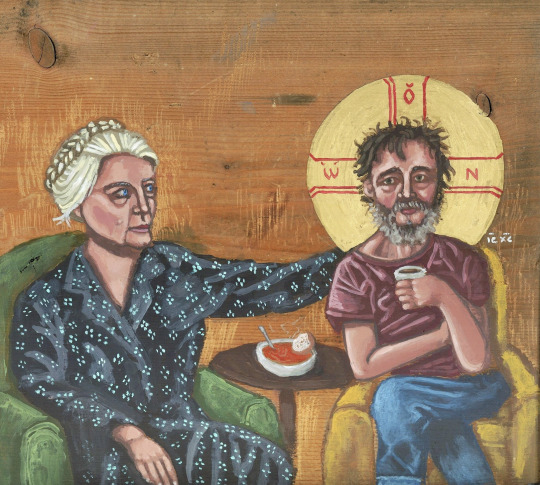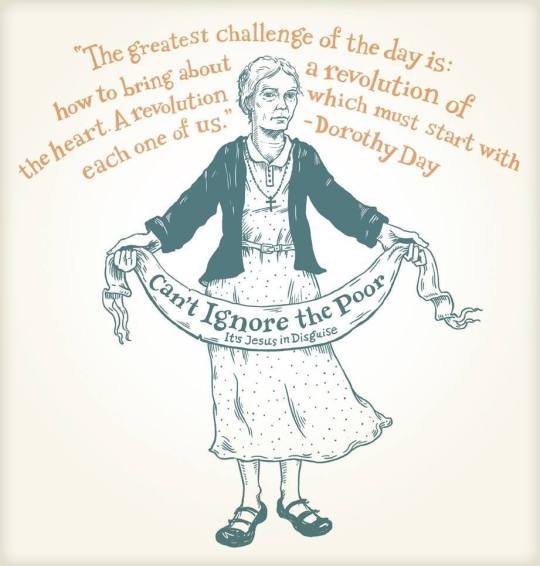#dorothy day
Text

308 notes
·
View notes
Text
I do not know how to love God except by loving the poor. I do not know how to serve God except by serving the poor.... Here, within this great city of nine million people, we must, in this neighborhood, on this street, in this parish, regain a sense of community which is the basis for peace in the world
Dorothy Day
#catholicism#christianity#works of mercy#spiritual works of mercy#corporal works of mercy#quote#dorothy day#dorothy day quote
251 notes
·
View notes
Text

Servant of God Dorothy Day
38 notes
·
View notes
Text
“Writing is hard work. But if you want to become a writer you will become one. Nothing will stop you.”
― Dorothy Day
#writers#creative writing#writing#writing community#writers of tumblr#creative writers#writing inspiration#writeblr#writerblr#creative inspiration#writer quotes#author quotes#dorothy day#quote of the day#writing advice#just write#writers life#be a writer
141 notes
·
View notes
Text
I've been going around feeling rather shocked and miserable. Also I awoke too late for Mass and that spoiled my day. I always feel sad at keeping Lent so badly. I keep resolving and failing miserably and starting in again.
Diary entry of Dorothy Day, Servant of God, for March 23rd, 1934 (found in The Duty of Delight, Robert Ellsberg's compilation of her journals)
(You know, for those who are already feeling a little bad about how their Lent is going)
231 notes
·
View notes
Text

Left side: In clockwise order from the top left, Dorothy Day (Catholic Worker Movement), Daniel Berrigan (Anti-Vietnam War/Ploughshares Movement/Peace activist, imprisoned for draft resistance activities), Dietrich Bonhoeffer (Anti-German government from 1933-1945, when he was murdered by that same German government), and Oscar Romero (now a saint, human rights and social reform advocate in El Salvador (Liberation Theology adjacent), murdered with the approval of the CIA in 1981). And then MLK.
Right side: Christofascists you are probably very familiar with. The least persecuted people ever crying the loudest that they are being repressed. Fuck 'em all.
It's weird to think my dad knew Daniel Berrigan (fairly well, they were in the Jesuits at the same time and Berrigan influenced him to become a CO during Vietnam, though his draft number was never called (he ripped up his draft card when he received it, kept half of it in his wallet for a long time, I think it's now somewhere in his office)) and Dorothy Day (through folks who had been with CW for a long time, he said she was great but the way some Catholic Worker folks revered her was a little culty, and this was in 1960s-1970s San Francisco, where most things were a little culty to begin with) along with several people who knew Romero and Merton (not featured here but Thomas Merton is tops). Small world, I guess.
#catholic left#dietrich bonhoeffer#daniel berrigan#dorothy day#catholic worker movement#oscar romero#mlk jr#christofascists
39 notes
·
View notes
Text

Happy birthday, Dorothy Day! (November 8, 1897)
A major leader of the left-wing Catholic Worker movement, Dorothy Day grew up in a nominally religious family, and consumed herself in the world of books. She read Upton Sinclair and Jack London, Kropotkin and Tolstoy, coming to embrace a radical social politics. She worked for several socialist publications, such as The Masses and The Call, and agitated for social progress while associating with radical figures such as Elizabeth Gurley Flynn. In 1926, Day converted to Catholicism, and in 1933 became a founder of the Catholic Worker movement, contributing frequently to its publications. A pacifist, Day stood consistently and resolutely against war. She also involved herself in the establishment of the Catholic Worker houses of hospitality, facilities which provide shelter, food, and resources to the destitute. She died in 1980 after a long life of activism, and the Church has explored the possibility of canonizing her since 1983, although some in the Catholic Worker movement object to this.
“People say, 'What is the sense of our small effort?' They cannot see that we must lay one brick at a time, take one step at a time.”
201 notes
·
View notes
Text

Dorothy Day
30 notes
·
View notes
Text
You can’t fix everything

“You can’t fix everything.”
It’s something we’ve heard for years. In a lot of different ways.
Sometimes, it gets said to us by someone else.
I’ve had it thrown back in my face before. Usually when I’m trying to tell people about the parish’s ministry to the homeless or some other good work that we’re planning.
Sometimes we say it to ourselves.
Usually when we’re frustrated. Either at what we see as the limits of the good we can do. Or at someone’s self-sabotage of the help that we’re trying to give them.
No matter how it gets said, “you can’t fix everything” is all too often a cry the heart.
And whether we say it to ourselves or someone else says it to us, it can lead us to stop even trying. Because we’re not seeing the results that we’ve told ourselves we should be seeing.
In those moments, we need to take a closer look at today’s Gospel. Where four people got their paralyzed friend to Jesus by lowering him down through a hole in the roof.
Think for a minute about what they didn’t do.
They couldn’t heal their paralyzed friend.
If that’s the standard for judging what they did, then they’re failures.
They couldn’t even get their paralyzed friend to Jesus to be healed like normal people.
If that’s the standard for judging what they did, then they’re failures.
What did they do? The got their paralyzed friend to Jesus to be healed in a way so unusual, so odd that we’re talking about it 2,000 years later.
They failed to fix anything. And they destroyed a roof doing it.
But look at the response they get from Jesus – He is excited and overjoyed at what they were able to do.
That’s the secret to this. You and I can’t fix everything. And God doesn’t expect us to.
God is calling us to step up, to help each other. Not by fixing everything, but by doing what we are able to do. Even if it’s nothing more than getting someone where they need to go, so they can get help.
God is calling us to do the good that we can do. Even if we can’t see the results.
As Dorothy Day put it, “People say, what is the sense of our small effort?
They cannot see that we must lay one brick at a time, take one step at a time. A pebble cast into a pond causes ripples that spread in all directions.
Each one of our thoughts, words and deeds is like that.”
Today’s Readings
#You can't fix everything#Do the good you can#Dorothy Day#Small#God#Jesus#Catholic#Christian#Church#Moments Before Mass
18 notes
·
View notes
Text
We are not expecting Utopia here on this earth. But God meant things to be much easier than we have made them.
On Pilgrimage by Dorothy Day
11 notes
·
View notes
Text
Think what the world could look like if we took care of the poor even half as well as we do our Bibles!
Dorothy Day
#catholicism#christianity#works of mercy#spiritual works of mercy#corporal works of mercy#quote#dorothy day#dorothy day quote
17 notes
·
View notes
Text

Don't Call Me a Saint — Dorothy day with Homeless Christ, by Kelly Latimore
12 notes
·
View notes
Text
Trusting the Poor to Make Their Own Decisions
A wealthy woman once visited the twentieth century activist Dorothy Day and pulled a large diamond ring off her finger. She handed it to Dorothy and asked her to use it for good. Dorothy dropped it into her pocket.
Later that day, a homeless woman knocked on the door at Dorothy's Catholic Worker house, begging for money. Dorothy calmly reached into her pocket and gave her the diamond ring.
Dorothy's friends were appalled. Later, while alone, they asked Dorothy if it would not have been better to sell the ring and use the money to rent a room for the beggar woman. Or perhaps they should have invested the money in a bank for her.
Dorothy replied, "She can do that with the ring if she wants to. She can see it and go on vacation if she wants, or she can just wear it on her finger and enjoy it if that's what she wants. Do you think God created diamonds only for the rich?"
Dorothy's response exhibits not just one, but two key principles of Catholic social teaching. Not only did she lavishly take an option for the poor by gifting the diamond ring, she also embraced the principle of subsidiarity, which says that decisions should be made at the lowest level possible. In this case, the lady receiving the ring should decide how to use it - not Dorothy, not her friends, and not the state.
- Brandon Vogt (Saints and Social Justice: A Guide to Changing the World, page 91). Bolded emphases added.
314 notes
·
View notes


